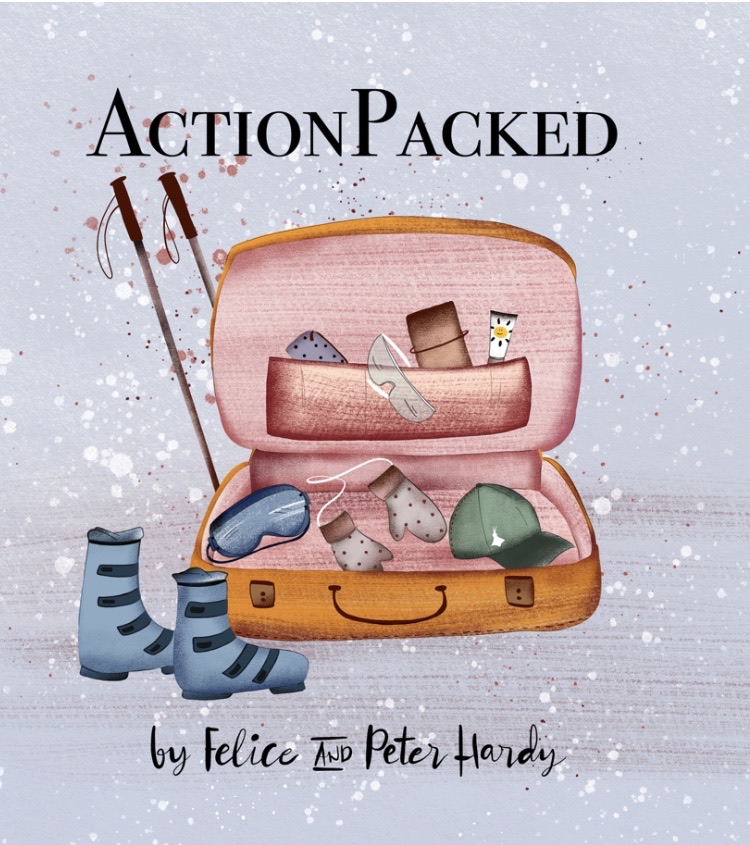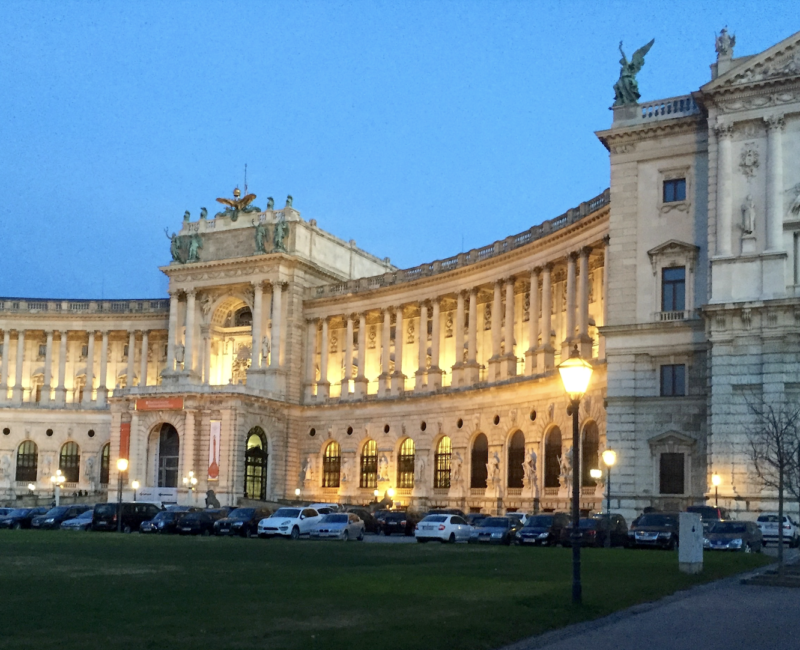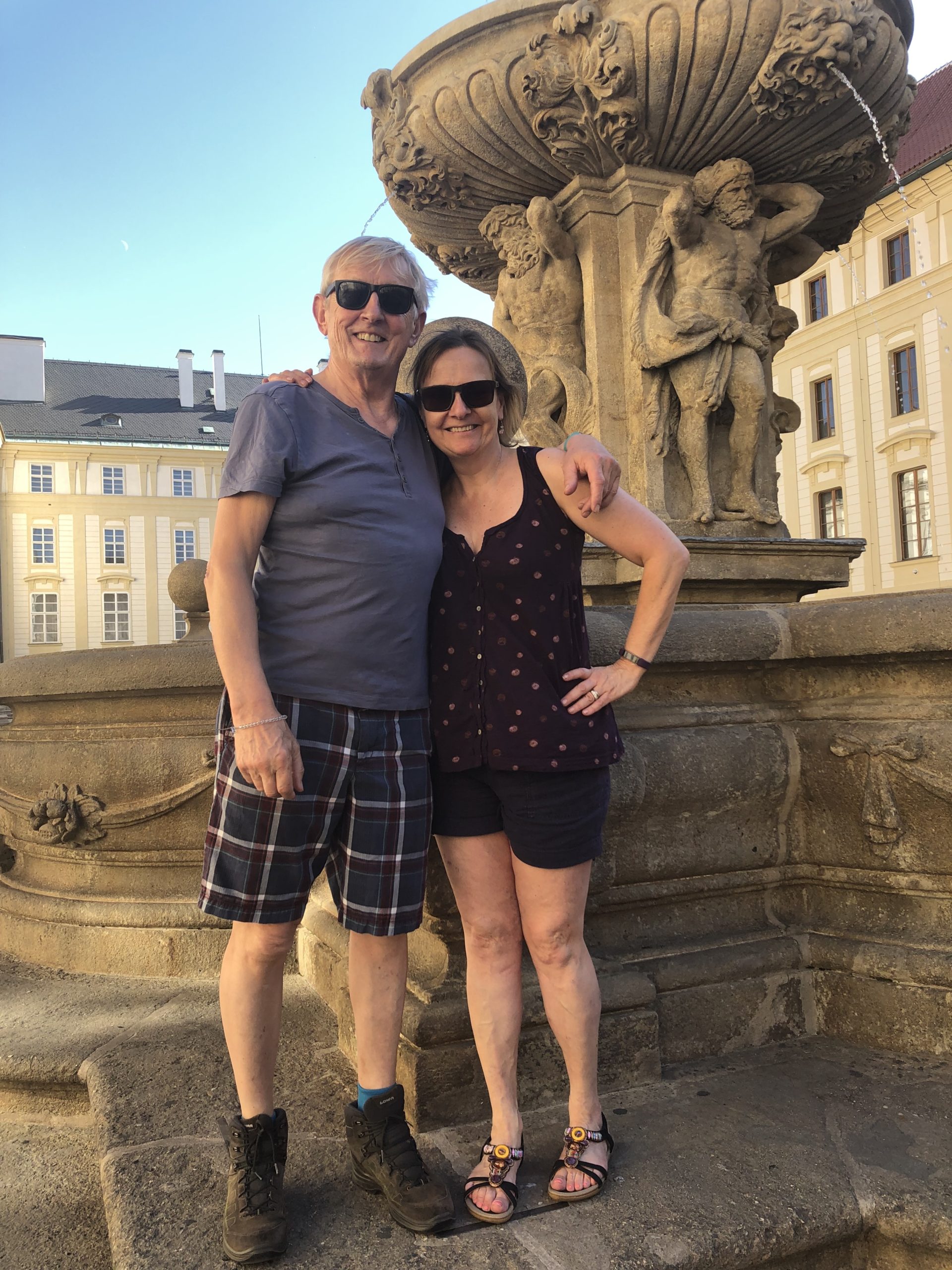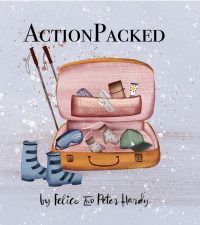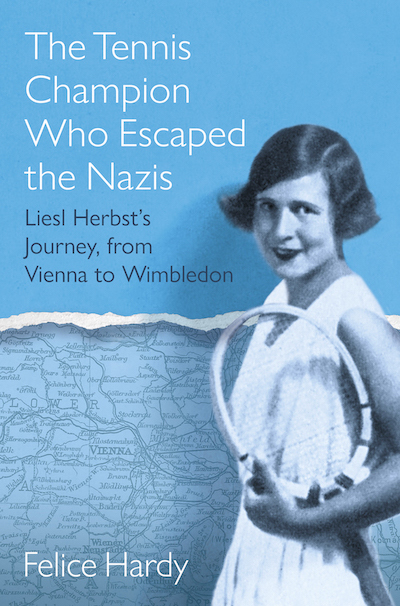
Peter Welcome to our travel podcast. We’re specialist travel writers, and we’ve spent half a lifetime exploring every corner of the world.
Felice So we want to share with you some of our extraordinary experiences and the amazing people we’ve met along the way.
Peter It’s an extraordinary place, isn’t it? It is enormous. There’s something to look at around every corner in every nook and cranny. It’s full of people, lots of tourists. This week, we’re in Vienna for an unusual episode of Action Packed Travel. Unusual because our principal guest is Felice herself. She’s just published a book about her grandparents’ dramatic escape from Vienna to London on the eve of World War II. And it’s also about tennis, which explains why the book’s release coincides with the start of Wimbledon and why we’ve flown to Vienna for this episode, because this magnificent city, the Austrian capital, is one of the principal backdrops for the story. Now, Felice, start by telling us the title and the connection to Vienna?
Felice It’s called The Tennis Champion Who Escaped the Nazis, which is my grandmother. But the book is equally about my grandfather as well. My grandmother was tennis champion, national tennis champion of Austria in 1930/1931, and then came to England. She had to leave Austria because of the Nazis in 1939 with my grandfather and my mother, who was a child. They came to England and she took up tennis again and played at Wimbledon in 1939.
Peter And I think she beat someone quite important in well, important by today’s standards, in order to qualify for Wimbledon?
Felice In order to qualify in 1939, she had to play three different women players, and one of them turned out to be Tim Henman‘s grandmother. She, of course, had to beat all three of them – and she did; she qualified. After the war, she played at Wimbledon again in 1946. And by this time my mother was older; she was at university and she played as well. My mother ended up playing seven Wimbledons in a row, as well as the US Open. Neither of them got very far, but they did play there. They remain to this day, the only mother and daughter to ever play doubles together at Wimbledon.
Peter That, of course, is a record that won’t be broken because they were in the amateur era, and now, of course, it’s a professional area. I think your grandmother was 46 at the time?
Felice Something like that, so pretty old…and she wasn’t according to my mother, she wasn’t even that good. But her skill was stamina and her stamina was extraordinary. She could outrun almost everyone.
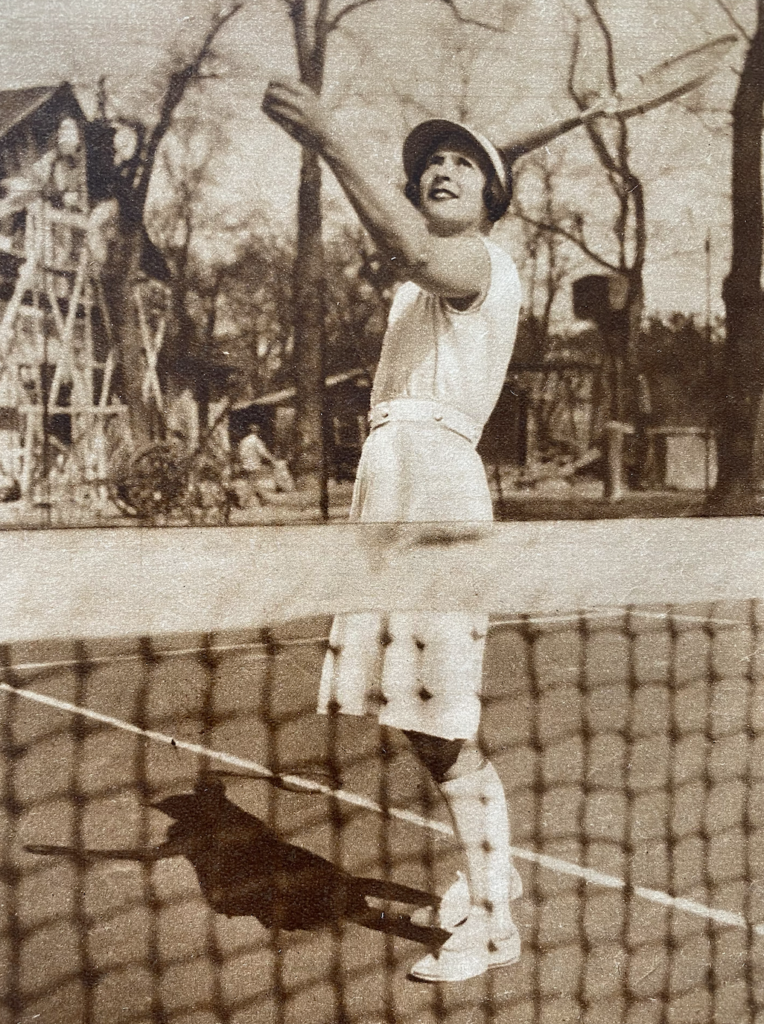
Liesl Herbst, 1930. Photo; © Liesl Herbst Collection
Peter But despite the title, the book is not really about tennis, is it?
Felice Of course it has tennis in it, but it is about my grandparents’ lives in Vienna with the opera and galleries and shopping.
Peter What kind of period are we talking about?
Felice My grandfather came to Vienna, I think it was in 1912. My grandmother not until a lot later. She married him in 1924. So they were there in the 20s and the 30s until, because of their Jewish heritage, they were forced to leave.
Peter Now, I know you started getting research for this book in 2015, but that’s probably 20 years after your grandmother…both grandparents died. Why did it take so long for you to wait and then decide to publish the book?
Felice Well, I was brought up without any religion at all, and I wasn’t told anything much about my grandparents’ and my mother’s early years. In fact, they wanted to forget all about it and start again when they came to England and I was brought up, if anything, as Church of England. And yes, I didn’t know anything and I was as much in rejected it as they did. I was told to reject it and so I carried on. Then in 2015, my daughter, who was a student at university, started asking me about her heritage and she knew that I was half Austrian. So we decided as a family to go to Vienna for a long weekend.
I took my three children and it really opened my eyes to the whole thing. And after that I started researching what I thought would be a book just for my family. Then it turned out that more people were interested in the subject, and now it’s being published. We’ve come back to Vienna today just to see all the different places where my grandparents lived, where my grandfather worked, all those sorts of things, just to bring back memories to refresh it for me alongside the launch of the book.
Peter It’s an extraordinary place, isn’t it?
Felice It is enormous. There’s something to look at around every corner, in every nook and cranny. It’s full of people, lots of tourists.
Peter So we’re standing in St Stephan’s Cathedral in the very heart of Vienna. This magnificent gothic building dates back to the 13th century, and it’s huge, 136m tall. And it was here that you had what you might call your Damascene moment that led you to research and write your book. And during that visit, you came into this cathedral and you had a strange experience.
Felice Yes, I’m going to read you a little excerpt from my book which describes it.
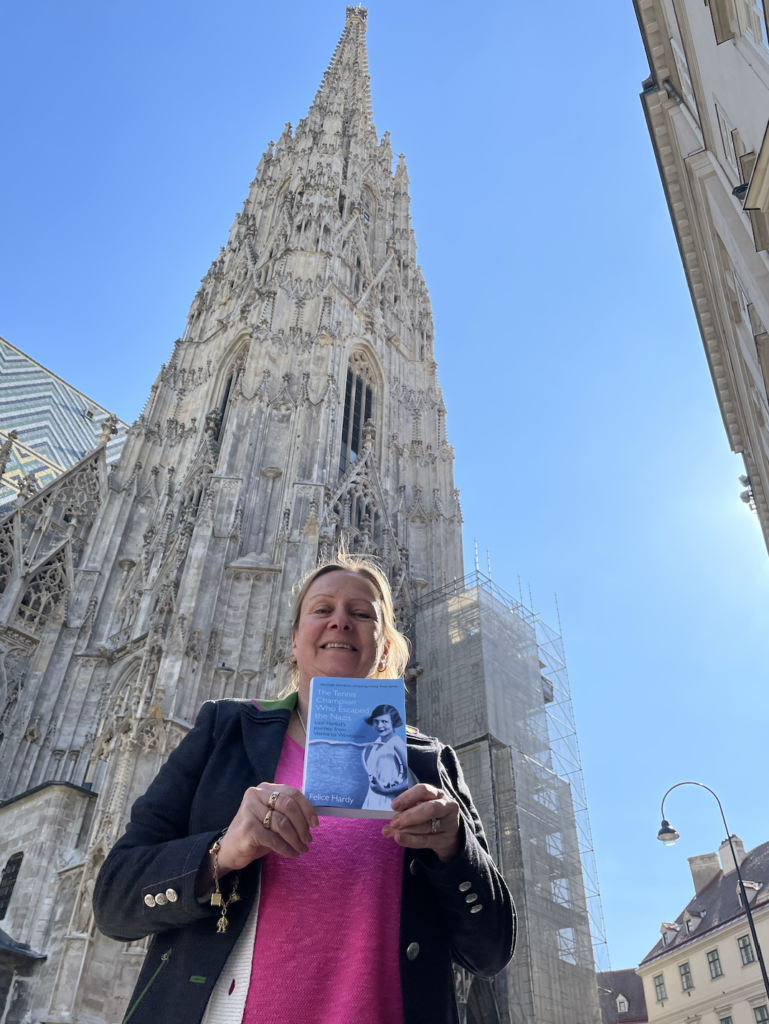
Felice outside St Stephan’s Cathedral, Vienna. Photo: © P.Hardy
“As I placed a candle near the altar, I sensed a presence behind me. When I turned to look, there was an empty space. ‘Thank you,’ came a whisper, ‘for remembering us.’ A frisson of warmth ran through me. Was it my imagination? I’d never been sensitive to ghosts before, but my grandmother Liesl, seemed to be here with me. It was the 13th of November when I stood in the flickering dark of St Stephan’s Cathedral, a non-Catholic in a public space that emanated a sensation of peace that was unexpected. The windows were suffused with a rainbow of colours and stone angels peered directly down, their frozen features threatening movement. When I entered through the Giant’s Door, a magnificent gothic tableau lay before me. Believers were lighting candles, but the burning wax looked like a funeral pyre and the overpowering smell of incense, even in that great cathedral expanse, made me choke.
So I stepped out through the heavy doors into a crisp November afternoon and took a deep breath of cold air. I looked up at the cathedral roof with its double-headed black eagle pieced together in mosaic. This was the emblem of the Habsburg family who had ruled the Austro-Hungarian Empire during my grandparents’ childhood. Liesl and my grandfather, David, had lived together in Vienna throughout most of the Roaring 20s and into the encroaching darkness of the years leading up to the outbreak of the Second World War.
In those carefree days of coffeehouses and culture, they’d been happy here. When I planned my trip to Vienna, I had no idea of what I was letting myself in for. I’d visited the city once before as a student, but was a lot more interested in the bars my Austrian boyfriend took me to than in exploring the culture, or indeed my family’s history. Now I was seeing Vienna through more mature eyes.”
They met in 1923, both from very different backgrounds. My grandmother from a wealthy background. She came from a small town called Jägerndorf, which today is in the Czech Republic, where her father ran a distillery. My grandfather came from a village in the Tatra Mountains in Slovakia, which, like my grandmother’s home, was in the Austro-Hungarian Empire at the time but today is in Slovakia. What they had in common was that they were both Jewish.
Now, during my childhood in London, I knew very little about this. In fact, my mother, who’d come to England with her parents as refugees in 1939, she was pulled from her roots in Austria, German-speaking. At school aged 12, in England, she didn’t know a word of the language. My grandmother knew a bit of English. She was the only one, and they had to start their lives all over again.
Because of that, my mother decided when she was an adult and then married an Englishman, that she wanted her children to be brought up in the English way, not have any reference to their Austrian or Jewish background at all, which was all a bit strange. I knew that my mother was Austrian, but I knew very little more than that. My roots were kept hidden and it was a secret they kept.
In fact, I found this talking to other people whose families survived the Holocaust, there was enormous guilt at surviving and getting away while they left other members of their family behind to die. For example, my grandmother’s two sisters were both killed and my great grandmother (also called Felice) was killed as well. Lots and lots of them perished in concentration camps. But my book, as well as not being strictly a tennis book, is also not a book about Auschwitz at all. It’s a book about the Holocaust and the consequences. But it ends with hope because it’s also about my life and how it how I interacted with my grandparents and my mother…and the determination of one woman, my grandmother Liesl, to beat the odds and play tennis at Wimbledon. The book is also about my journey to discover myself because I didn’t really know who I was while I was growing up, and now I do. It’s been a very cathartic experience writing this book.
Peter So tell us what you’ve done today?
Felice Well, we’ve had a busy day out in Vienna going down memory lane, or at least my grandparents’ memory lane. We started off at St Stephan’s Cathedral. We then we went to my grandfather’s office. A picture of my grandfather, David, and his brother Otto, standing outside, proudly outside the door of this enormous building.
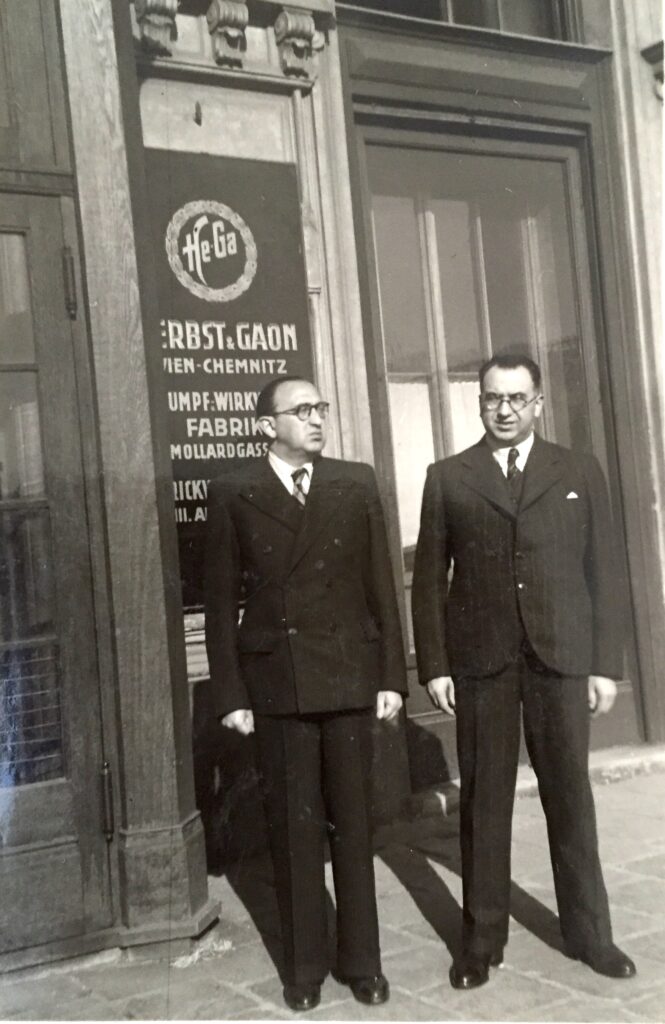
David, left, with his brother Otto outside Palais Wickenburg. Photo; © Liesl Herbst Collection
It was called Palais Wickenburg at the time, and they had 38 staff. The windows were bow shaped at the time, I can see from the pictures, but they’re now very plain rectangles. So it’s changed quite a lot. He wouldn’t recognise it and the building is peeling rather sadly. Inside is…what looks like an interior design shop these days.
Well, we took some pictures outside and looked at how it had changed. Then we crossed the river and the canal, and we went on the very, very efficient, clean and relatively uncrowded underground. Very clear and simple it is to follow and find your way around. We went to Hakoah, which is a sports club – a large sports club was once the largest sports club in the world.
Peter And your grandfather was its vice president and then president in the 20s and 30s. It’s because of Hakoah and a football match that your grandparents first met, isn’t it?
Felice Hakoah is a Jewish club. It was first formed because Jews were banned from other clubs and they decided, ‘Well, let’s start our own.’ So they had all sorts of sports: swimming, tennis, skiing, football, wrestling. Anyway, David took their football team to London in 1923 to play West Ham at Upton Park, and to the astonishment of fans, Hakoah beat them 5-0. As a reward, David took them to Paris, and that’s where he met Liesl.
Today…very good facilities and we were shown around, shown the tennis courts. I tried to imagine my grandmother playing there many, many years ago, although obviously it’s changed a lot. And then we came back and we are now sitting in Demel, which was my grandmother’s very favourite coffee house. It’s a typical Viennese coffee house with marble tables, comfortable chairs and sofas.
Peter Very busy, very busy.
Felice You have to queue outside. We had to queue for about probably about five minutes outside, and delicious food. Their speciality is Kaiserschmarrn, which is one of our favourites, which is a chopped-up pancake with plums on top. Absolutely delicious. And then we had Viennese coffee. Really, really delicious and relaxing and really good place to rest our legs after a lot of walking.
Peter What would your grandmother say if she was here right now?
Felice Oh, it’s exactly how I remember it. It hasn’t changed at all. Because Demels hasn’t. It’s a little bit of old Vienna exactly as it was in her day.
Peter I’m walking through the streets of Vienna. It’s really easy to imagine what it was like in the 1920s and 1930. The most sensational buildings. The is really wonderful, isn’t it?
Felice There are even horses and carriages going around, as there would have been in her day. Obviously, these ones today are for tourists and not for people living there. Cobblestone streets, beautiful buildings, Gothic, Habsburg-era yellow-cream buildings, a lot of them with statues on top.
Peter And the park.
Felice In the Prater park the highlight is the Riesenrad, which is a big wheel, but it’s pretty old fashioned. It’s a bit like…for those of you who ski…like a gondola, but with old-fashioned little carriages going round and round very, very slowly, but with a lovely view of Vienna.
Peter So tell us about your childhood, because I think that’s quite influential on what’s happened to you in terms of writing the book and finding yourself, if you like?
Felice Well, I knew that I was half Austrian, but I never went to Vienna. I knew that my mother came from Vienna, was born there. I never actually went there until much later, until I was a student and went there to stay for a week. It is a beautiful place. My childhood was very much London based. My father was British; we lived in south west London and I didn’t know much about my Austrian heritage at all.
Peter Your family were a warm family, would you describe them?
Felice My mother was not warm at all; not to her children, anyway. My childhood was dominated by my grandparents, and in fact, they outlived my mother so they were very influential in my life.
Peter How did your grandparents settle in England? Were they happy?
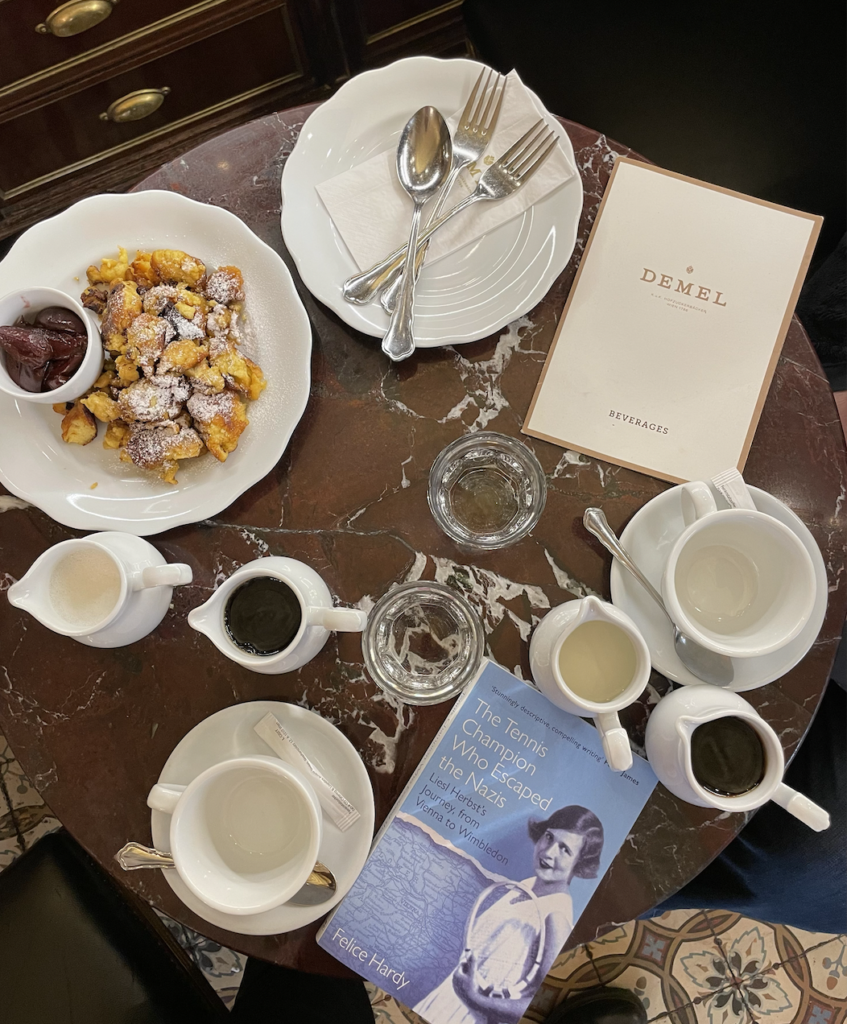
Felice’s book in Demel, her grandmother’s favourite coffeehouse. Photo: © F.Hardy
Felice They were, actually, yes. My grandfather was…both of them were very happy. They liked their life in London, just as they’d liked their life in Vienna. They closed one door on Vienna and opened another in London, and they didn’t really look back, although they did go and visit. My grandmother still liked to do her shopping in Vienna and would always come to Demel coffee house.
I did come to Vienna once during my grandmother’s lifetime, but really my main proper visit was in 2015. But she died 20 years before that, and I decided to come back because my children had encouraged me. So we came back and that’s when I saw Vienna properly for the first time.
Today I went back to some of the same locations as I went to in 2015 and again in 2018. I have been researching the locations for my book…Prague, Bratislava, some of the small towns in the Czech Republic and Slovakia today, but really my two favourites will be Prague and Vienna. And Vienna is the one that I know best.
Peter Here we are in the shop.
Felice Demel’s…delicious…equal probably to the Sacher Hotel. And they compete for who has the best Sachertorte – a delicious chocolate cake with apricot jam inside. I think that’s right. And whenever my grandmother went to Vienna when I was a child, she’d bring me back a mini Sachertorte, a whole cake. So I was very excited about that.
Peter The display of cakes and other goodies here is really quite extraordinary, isn’t it?
Felice It’s amazing. I could eat everything in this shop. Everything is so beautifully displayed and packaged. I mean, actually, boxes of chocolates. That’s an art form in Vienna. The boxes themselves are too good to open. When they got married, David and Liesl left David’s bachelor flat in Kohlmarkt in the city centre where he lived for eight years, and they moved into a large apartment in a leafy residential district. As I say in my book, Vienna, 1924, the street where my grandparents lived, Goldegasse was in the middle-class fourth district, sufficiently far from the bustling city centre to provide tranquillity, but by no means suburban.
“The three-bedroom apartment lay on the second floor of a neo-Renaissance building that dated back to 1823. It was approached via a communal front door that led onto a marble hallway. Across the road was the Belvedere Palace, its formal gardens filled with classical statues and ornate fountains. ‘It’s so exciting,’ Liesl said as she opened the French windows and stepped onto the balcony. ‘I still can’t believe I live in an apartment with the best view in Vienna.’
‘I’m not good with decoration, but why don’t you visit some fabric and furniture shops? Maybe an antique shop too?’ David suggested.
‘I’d love that.’ David’s priority was always the bathroom. The result of a childhood spent washing in a bucket. But Liesl planned for the apartment to be a scaled down version of her family home in Jägerndorf. She’d always admired her mother’s taste, so she spent the next few weeks going to shops and auctions. David was impressed with her purchases, although he wasn’t happy about the amount she spent on a single pair of shoes.
Peter So we found the apartment with ease. It’s actually in an amazing position. Right by the Belvedere Palace, isn’t it?
Felice Yes, It’s in a very tall baroque building, typical of Vienna. And it’s literally across the road from the Belvedere Palace.
Peter Which has got some pretty magnificent gardens, hasn’t it?
Felice They’re beautiful. I’d say they’re the equivalent of Hampton Court in London.
Peter Yes, very formal gardens with amazing water spouts and fountains, water features. You can imagine your grandmother – or probably not your grandmother, but the nanny at least – wheeling your mother around in a pram.
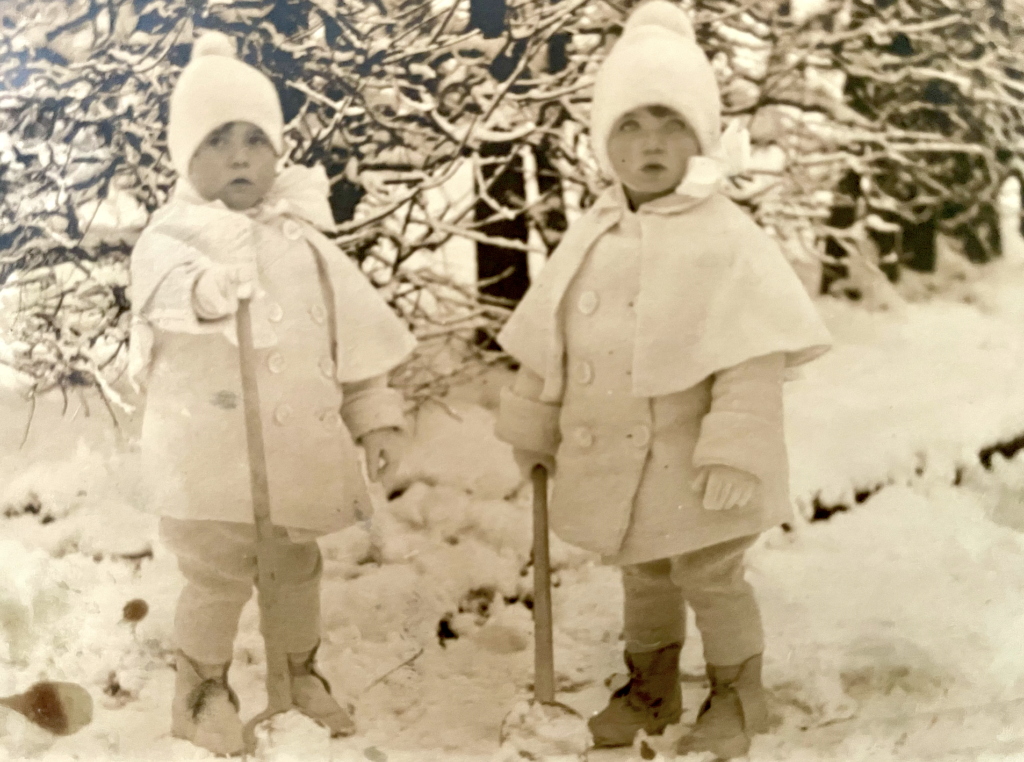
Dorli, left, with her cousin Harriet in the Belvedere Gardens, Vienna, late 1920s. Photo; © Liesl Herbst Collection
Felice That’s right. In a huge perambulator. She and her cousin Harriet, who were more like sisters because they were both only children.
Peter It was certainly a very leafy environment in which to live. Of course, the palace now is a major art museum and at the moment it houses all the works of Gustav Klimt that Austria owns. We got a chance to see it, didn’t we? It’s pretty amazing.
Felice It was incredible. Lots of other artists of that period – Expressionists.
Peter I particularly interested in Klimt because actually I see that just this last few days, his final portrait sold for a modest £85.3 million, the most expensive artwork ever in Europe. I think your grandmother would be…she loved her art…truly amazed by that kind of price, right?
Felice Yes. I don’t think she loved that sort of art. It was a bit modern for her at the time. She preferred old masters, Dutch, Flemish, old masters.
Peter And then I think your grandmother used to walk from here to the Prater park to do her tennis.
Felice Yes, you can walk. It’s a large park, the Belvedere, and you can walk right across it into the centre of town – so from a suburb into the centre.
Peter Yes, we’re talking about, what, at least a half an hour to do it, I guess.
Felice Probably, but it was a good way to keep fit. Here’s another passage from my book.
“One evening in March 1938, Liesl was walking the five kilometres home from the tennis court, where she’d had a difficult encounter with the secretary of a tennis club close to Salzburg, who happened to be visiting Vienna and had watched her practising. Her journey took her through an alleyway where the tall buildings closed out most of the light. She headed for the gap at the end where a gate beckoned. Huddled in the shadows were the figures of a man and a woman in their early 20s. The man was an SS uniform and looked proud and dominant. Liesl tiptoed by, not daring to breathe. She opened the gate and hurried into the road beyond. She exhaled when she saw the white shuttered windows, the tall baroque buildings, formal yet reassuringly familiar. As she continued her walk home, she replayed the earlier conversation with Anton Moser, the provincial tennis club secretary. She’d played in the annual tournament for the past couple of years and done well reaching the semi-finals and then the finals in the following year. She told him she intended to compete again this summer.
‘Frau Herbst,’ he said, ‘you will understand that your participation may be difficult.’
‘But why?’ She replied.
‘Let me be frank, Frau Herbst. I have no personal knowledge of your racial origin. But I understand that not only are you a member of Hakoah, but your husband is the president of this Jewish club. Given the current political climate, I’m sure you will understand.’
Liesl had turned away in astonishment. By the time she reached home, she was for the first time, seriously worried about her career. She trembled as she changed for dinner. Maybe now was the time to leave the tennis limelight until the situation improved.”
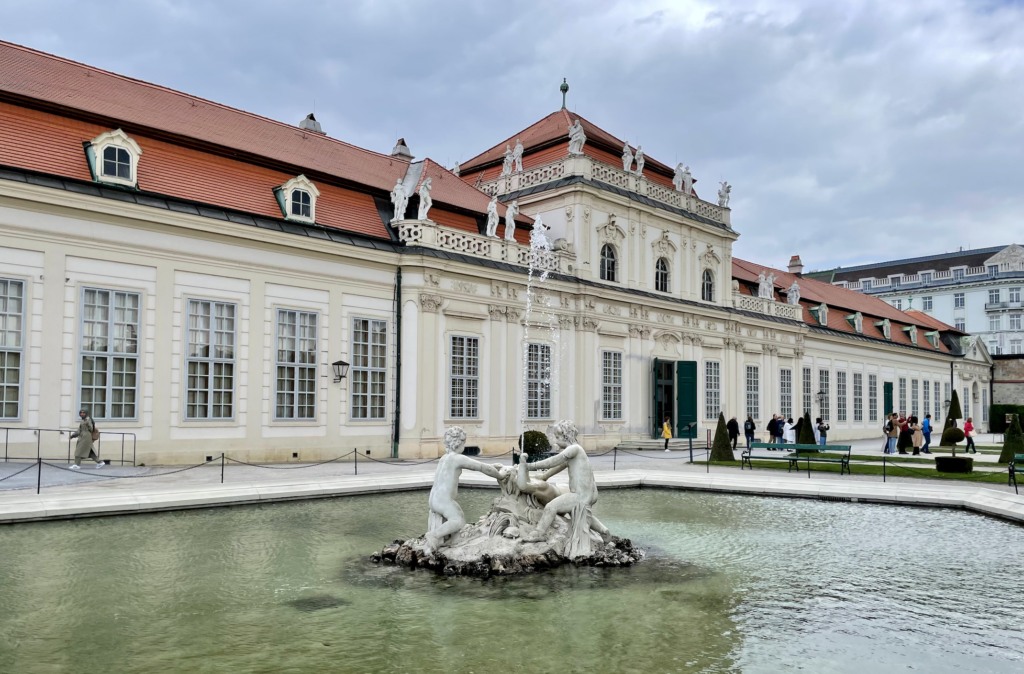
Belevedere Palace. Photo: © F.Hardy
Peter But if you’re going to spend a few days in Vienna on holiday, regardless of whether you’re trying to look up something from the past as we have been, it’s a pretty wonderful city, isn’t it, to go to?
Felice I love it. It’s one of my favourite European cities.
Peter It’s good for me that you with your Austrian heritage, you appreciate it. You feel Austrian in it.
Felice Yes, I do when I’m there. Although I don’t speak German very well, unfortunately. But one of the best things is how easy it is to get around the city. There’s the underground, very efficient, very clear and easy to follow, and the trams haven’t died.
Peter The trams, actually, I’m sure it’s okay.
Felice I have, but not this time. And you can walk everywhere too. It’s not huge.
Peter Yes, I love walking around cities. I love walking around Paris, and actually Vienna is obviously smaller and easier to move around.
Felice So if you’re planning a trip to Vienna to go down memory lane like I did or otherwise, just because you want to go to a very beautiful city, I suggest you do what we did. Our trip was organised by Austria Tourism with flights by Austrian Airlines, and we stayed in a very convenient hotel called the Hotel Gilbert, which is in the museum quarter. And we bought a Vienna City Card, which was really invaluable because it included on it a very quick airport – transfer 16 minutes direct, the U-Bahn underground and discounts in all the museums we went to, including the Klimt exhibition at the Belvedere Palace. We wished we’d had time to go to the Leopold Museum, which apparently has amazing art as well.
Peter Felice, tell us the name of the book again?
Felice It’s called The Tennis Champion Who Escaped the Nazis, and it’s from AdLib Publishers. It costs £9.99. You can get it from Amazon, W.H. Smith, Waterstones, and you can order from your local bookshop, online book outlets, and it’s available on Audible as a talking book, and Kindle as well. And if you don’t live in the UK, you can still get it on your own Amazon. I’ve got a website, a blog where you can find out about events that I’m taking part in and that is felicehardy.com.
Peter Well it’s been great having you on the show actually we always have you on the show, but it’s been particularly good this week.
Felice Thank you very much for having me. That’s all for now. If you’ve enjoyed the show, please share this episode with at least one other person! Do also subscribe on Spotify, i-Tunes or any of the many podcast providers – where you can give us a rating. You can subscribe on Spotify, Apple Podcasts or any of the many podcast platforms. You can also find us on Twitter, Facebook and Instagram. We’d love you to sign up for our regular emails to [email protected]. Until next week, stay safe.
© Action Packed Travel

- Join over a hundred thousand podcasters already using Buzzsprout to get their message out to the world.
- Following the link lets Buzzsprout know we sent you, gets you a $20 Amazon gift card if you sign up for a paid plan, and helps support our show.
